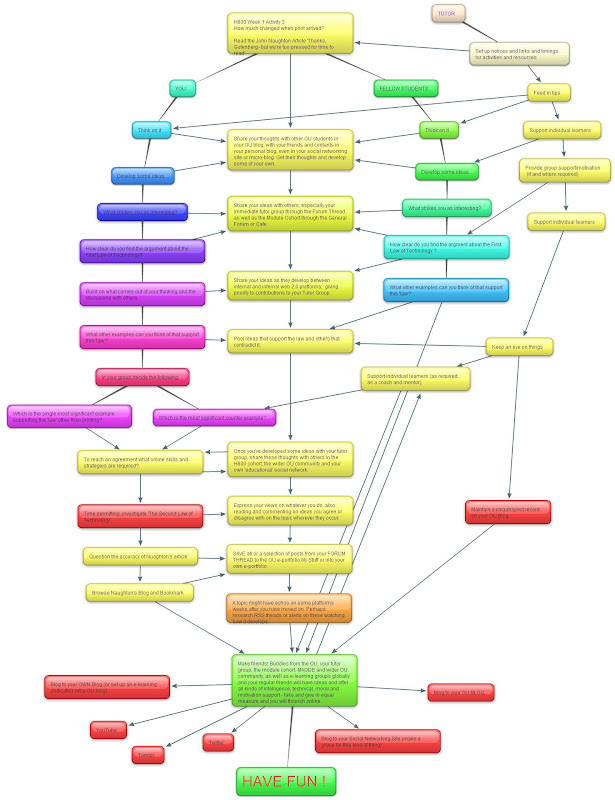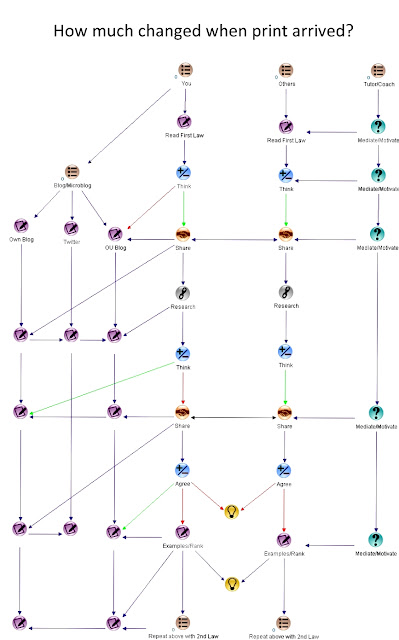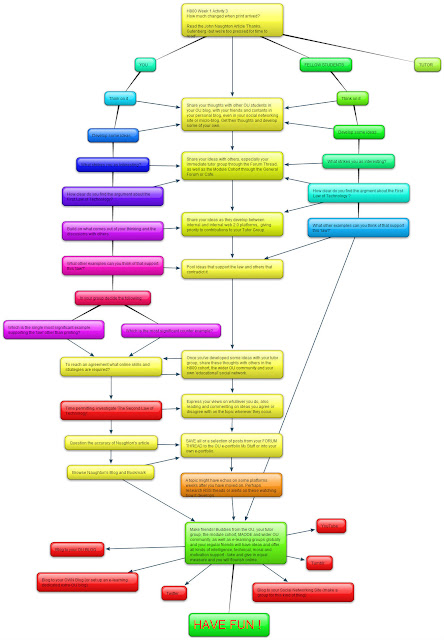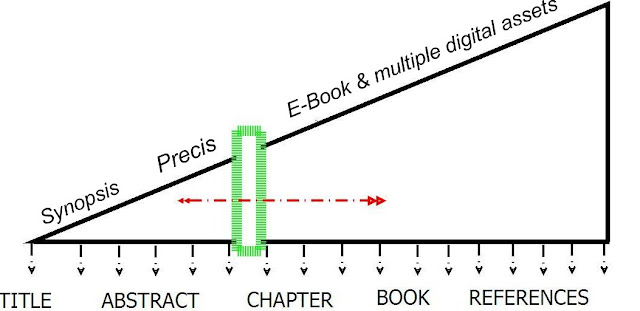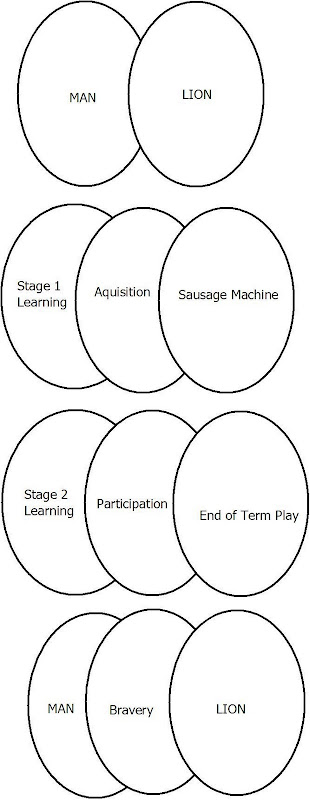
Eating humble pie
At various times over the last 12 months I have knocked the MAODE because of the amount of reading required, particularly in H808 ‘Innovations in e-learning’, where it rankled to read reports that felt out of date or books of the last century, and across the modules for the lack of examples of ‘innovations in e-learning,’, as if the MAODE should exploit the students by sending through the online hoops the equivalent of a performance in a Cirque du Soleil show.
I take it back:
I eat humble pie for and offer three reasons:
1. Reading works
2. The earliest investigations on things we now consider common place and highly revealing
3. Bells and whistles may have no tune Reading works, though it is unnecessary to have the books in your hand, or to print of the reports.
I’ve done both, starting the MAODE or ODL as it was called in 2001, I had a box of books delivered to the door (I have many of these still).
Picking it up again in 2010 with H807 ‘Innovations in e-learning’ for want of an e-reader or adequate computer I found myself printing everything off – it unnecessarily fills eight large arch-level files (where if kept for a decade, they may remain).
There is value in printing things off
Whilst some links and too many follow up references from books and reports read in H807 were broken, I have the links and reports I downloaded and printed off in 2001.
One of these, exactly the kind of document I would have rejected in 2010 as dated, was written in 1992.
What is more, this paper addresses something that one would imagine would need a modern perspective to be of interest, the subject is the value of networking – what we’d call online collaboration or participation today.
The earliest investigations reveal the inspiration at a time when there were few options.
One the one hand I can go to the OU Library and type in ‘participation’ and ‘e-learning’ and be invited to read as PDFs a number of reports published in the last few months, on the other, I can go and see some of the earliest efforts to understand the possibilities and overcome the technical issues in order to try and recreate for distance learners what campus based students had all the time – the opportunity to meet and share ideas, the tutor group online, as it were.
See below
Computer Networking for Development of Distance Education Courses (1).
In my teens and helping out on video-based corporate training films I recall some advice from the Training Director of FIH PLC, Ron Ellis. It’s one of those irritating corporate communications acronyms:
‘Keep it Simple, Stupid’
(as it was, though as some now prefer)
‘Keep it short and simple’.
It’s a fascinating story and remarkably for Wikipedia were entries are often anything but, it is short and straightforward.
The points I am making are straight forward too.
1. Reading
2. Research and References
3. Simplicity
An e-reader is simple
The process is enhanced and highly tailored once the content you need to consume is in a device that is slimmer than a slim novella. The affordances of the e-reader mean you can do away with pen and paper (though not a power or USB cable).
My passion for reading, where the 'Content is King', which perhaps unnecessarily brings me back to Wikipedia.
What you read, and the fact that you read, matters more than its being in paper form, whether chained to a shelf in the Duke Humphrey’s Library, Oxford (Bodleian), or bubble-wrapped from Amazon, let alone printed off on reams of 80sgm from WHSmith, holes punched and the thing filed for delayed consumption.
Reading too, I realise, is the purest form of self-directed learning
Vygostky would approve.
You are offered a list of suggested titles and off you go.
Parameters help
It is too easy to read the irrelevant if your only guide is Google and it is just as easy to purchase or download a book that has the title, but whose author could at best be described as ‘popular’.
It may fell archaic and arcane to be presented with a reading list, but I recognise their value, if only as the maelstrom of digital information spins across your eyes you can focus.
It may require effort to skim read the abstracts and contents of 33 books and papers in order to extract three or four to read over a two week period (as required to do in May 2001 on the then ODL), but the method works:you get an overview of the topic, a sense of who the authors and institutions your ‘school’ considers of interest, and then motivated by making some choices yourself, you read.
This in itself is one reason to avoid Wikipedia
if everyone reads the same content, everyone is likely to draw the same conclusions.
In any case, my issue with Wikipedia is three-fold, entries are either too short, or too long and there is no sense of the reader, the audience, for whom they are written; at times it is childish, at others like reading a doctoral thesis.
Or am I missing the point?
it isn’t a book, not a set of encyclopedias, but a library, communal built, an organic thing where those motivated to contribute and who believe they have something to say, do so; though all the corporate PR pap should be firewalled out.
Either way, my ambition is for WikiTVia, in which the entire content of Wikipedia is put in front of the camera and shot as chunkable video clips.
Anyone fancy giving it a go?
I digress, which is apt.
If you have a reading list you are less likely to get lost
What is more, you will have something to say in common with your fellow pupils when you’re online.
It matters for a niche conversation to be 'singing from the same hymn' sheet which is NOT the same as singing the same tune.
(Aren’t I the one full of cliché and aphorisms this morning).
Which brings us to point three, and a theme for Week 2 of H800 ‘Technology-enhanced learning: practice and debates.’
A title I have just typed out for the first time and I initially read as ‘Technology-enhanced debates’ which could be the right way to think of it given an initial taste of Elluminate.
It doesn’t work and there seems to be little desire or interest to fix it.
Google take over please.
I’d liken my first Elluminate session to my first attempt (indeed all my attempts) to learn to row.
Think of the Isis, early November morning, eight Balliol Men kicked out of bed by 3rd year student Miss Cressida Dick to cycle down to the boathouse.
We varied in shape and size like the cast of a James Bond movie:
Roger Moore and Timothy Dalton, Jaws and Odd-Job, Scaramanger and Ros Klebb, Goldfinger and Dr. No.
Despite our coach Dick's best intentions everything that could go wrong, did go wrong.
Later that term on in our only race we were promptly ‘bumped’ and were out.
I wonder if the joint experience of Elluminate will find us bumping along discontentedly for the next few months?
My suggestion would to disembark to something simple, that works (as we did in H808)
Elluminate to Skype with Sync.in or Google.docs is the difference between crossing the English Channel on Pedalos, or sharing a compartment on the Eurostar.
Had this been a business meeting I may have said let’s email then pick up the phone and do a conference call that way.
If it had mattered and the journey was a matter of hours I may have said, hold it, let’s meet in a couple of hours.
What matters is achieving the outcome rather than trying to clamber on board a beach-side round-about on which the bells and whistles are falling off.
Reading, referencing and simplicity brings me to a paper we were expected to read in 2001.
Computer Networking for Development of Distance Education Courses (1) Tony Kaye.
Institute of Educational Technology
Downloaded 15/05/2001 http://www.icdl.open.ac.uk/mindewave/kaye.html
(Link broken and my searches thus far have not located a copy of this paper)
It was written in 1992.
(Until this week I baulked at reading anything pre Google, Facebook or Twitter. What, frankly is the point if none of these highly versatile, immediate forms of collaboration and communication online are not covered?)
This report is as relevant to synchronous and asynchronous collaborative online learning in 2011 as the earliest books coaching rowing.
The basic issues remain the same: the problem to solve, the goal and outcomes.
It’s relevance is like starting any conversation about the Internet with Tim Berners-Lee and CEARN.
In the paper, expert discuss the potential for computer support through local and wide-area networks for ‘work groups engaged in collaborative authoring tasks.’
You see, this, to keep it simple, is all we were trying to achieve on Elluminate, a ‘work group engaged in collaborative authoring tasks.’
Today we can hear and see each other, though the voice will do – and despite being so anachronistic, we can, presumable, all type on a QWERTY keyboard.
Courtesy of Cloud computing any other shared tool, from word, to spreadsheets, presentations, art pads and photo manipulation, we could choose to use from a plethora of readily available free choices.
‘it takes as a basic premise the need for a progressive co-evolution of roles, organisational structures, and technologies (Englebart and Lehtman, 1988), if technology is to be successfully used for group work.’
‘A summary of some of the main findings from studies of traditional (i.e. non technology-supported) course team activities is presented’.
This I consider important as it re-roots us in the very process we are trying to recreate online, a meeting between people, like or not-alike minds, with a common theme and goal.
This report was written for and about teams planning and writing distance teaching materials, however, as it points out,
‘many of the issues raised are relevant to other group collaboration and authoring tasks, such as planning and writing reports, research studies and books.’ Kaye (1992:01)
It makes fascinating reading, not least the comprehensive list of items that would have to be co-ordinate to create a distance learning ‘package,’ resplendent with diskette and C90 audio cassettes, 16 hours of TV and a 300 page course Reader.
Have things moved on?
Where’s our TV in MAODE?
I actually believed in 2001 I’d be getting up in the middle of the night to view lectures.
We don’t have lectures in the MAODE, why not?
It should not be a dying form.
The detail of designing, developing and producing a distance education package, though interesting in itself, is not what I’m looking for in this report, so much as how the teams used the then available technology in order to work together collaboratively online.
They had a task to undertake, a goal.
There were clear, agreed stages.
The emphasis on this report (or book chapter as it is sometimes referred to) are the ‘human factors’.
A wry smile crosses my face as I read about some of the problems that can arise (it sounds familiar):
- Lack of consensus
- Differing expectations Nature of roles and tasks ‘differences in the perceived trustworthiness of different colleagues’ [sic]
- Different working patterns “Varying preferences in use of technology (which in this case include academics who use word-processors and who ‘draft in manuscript prior to word-processing by secretary” [sic]
Then some apt quotes regarding the process from this disparate group of individuals:
‘working by mutual adjustment rather than unitary consensus, bending and battering the system until it more or less fits’ (Martin, 1979)
‘If some course teams work smoothly, some collapse completely; if some deliver the goods on time, some are hopelessly late. Course teams can be likened to families/ Happy families do exist, but others fall apart when rebellious children leave home or when parents separate; most survive, but not without varying elements of antagonism and resentment.’ (Crick, 1980)
There is more
In microcosm it’s just the same on the MAODE.
I come to this conclusion after four or five ‘collaborative’ efforts with fellow students.
We’re human
We work together best of all face-to-face, with a real task, tight deadlines and defined roles, preferably after a meal together, and by way of example, putting on a university play would be an example of this.
Recreating much or any of this online, with a collections of heterogeneous strangers, with highly varied lives not just beyond the ’campus’ but possibly on the other side of the planet, is not unexpectedly therefore primed to fail.
This said, in H808, one collaborative experience I was involved with, between six, with one in New Zealand, was a text book success.
Why?
As I put it then, ‘we kept the ball rolling,’ in this case the time zones may have helped (and my own insomnia that suggests I am based in Hong Kong not Lewes, East Sussex).
It also helped to have a Training Manager from the Navy, and a Training Manager (or two) from Medicine.
There was professional discipline that students and academics seem to lack.
Indeed, as academics often say themselves, they don’t have proper jobs.
Isn’t it about time that they behaved like the professional world, indeed, took lessons from corporate communications instead of getting things wrong all the time?
I read this from the 1992 report and wonder if when it comes to the people involved much has changed inside academic institutions.
‘There is evidence to suggest that course team processes can become pathological if the factors listed by Riley(1983) (particularly, it could be argued, the ‘private’ factors) are not properly addressed.’ Kaye, (1992:08).
‘One experienced course team chairman (Drake, 1979) goes so far as to say that …
“the course team is a menace to the academic output and reputation of the Open University,” [sic/ibid]
‘because it provides a framework for protracted (and exciting) academic discussions about possible options for course content and structure, but that when the real deadlines are imminent, many academic are unable to come to define decisions and produce satisfactory material.’
!!!
If academics at the OU can’t (or couldn’t) work together what hope to do mature postgraduates have?
Our maturity and NOT being academics probably
‘problems can arise in the relationship between academic staff and radio or television producers’ Nicodemus (1984) points out that the resultant anxieties can cause “ … a lot of flight behaviour which simply delays and dramatises the eventual confrontations.’
I have an idea for a soap-opera set on the campus of the OU; this report provides the material
I'm not going to quote it all, but there is some social science behind it. Hopefully this paper or chapter is traceable.
Brooks (1982) has observed that when complex tasks are shared amongst individuals or small working groups, the extra burdens of coordination and communication often counteract the productivity gains expected from division of labour.
Problems arise from social psychological processes:
for example, pressures to confirm in a group might cause people to behave less effectively than if they were working alone, and diffusion of responsibility and lack of ownership of a group product can lead to group members contributing less effort to a group task tan they would to a personal, individual, project.
However, we are left on a positive note by this report
“ … the cycle of integration-disintegration is, after all, also known to be important in creativity.” (Nicodemus, 1984)
In the case of distributed course teams (eg those working on interdisciplinary, or co-produced courses) where, a priori, a strong case might be made for networked computer support for collaboration, it would seem important to pay even more attention to the underlying dynamics within a team.
Enough, enough, enough … I am only half way through this report.
Let’s skip to a conclusion, which is as pertinent today as it was in 1992.
‘The social, psychological, and institutional factors influencing the processes and outcomes of academic teamwork were stressed in the first part of this chapter (see above, this is as far as I got), because these factors are probably of greater overall importance in determining successes than is the nature of any technology support which might be made available to a course team'. Kaye (1992:17)
REFERENCES
Brooks, F 91982) The mythical man-month: Essays on software engineering. Reading. MA.: Addison-Wesley.
Crick, M (1980) ‘Course teams: myth and actuality’, Distance Education engineering, Reading, MA.: Addison-Wesley.
Drake, M. (1979) ‘The curse of the course team’, Teaching at a distance, 16, 50-53.
Kaye, A.R. (1992) ‘Computer Conferencing and Mass Distance Education’, in Waggoner, M (ed) Empowering Networks: Computer Conferencing in Education, Englewood Cliffs, N.J.: Educational Technology Publications.
Martin, J. (1979) ‘Out of this world – is this the real OU?” Open Line, 21, 8.
Nicodemus, R (1984) ‘Lessons from a course team’, Teaching at a distance, 25, pp 33-39
Riley, J (1983) The Preparation of Teaching in Higher Education: a study of the preparation of teaching materials at the Open University, PhD Thesis, University of Sussex.
Post script
In the course of writing this I discovered (courtesy of Wikipedia) that Leonardo da Vinci may have coined the phrase, or a version of ‘Keep it simple, stupid’ and also invented the pedalo. The mind boggles, or is Leonardo still alive and contributing ? (his fans certainly are).
